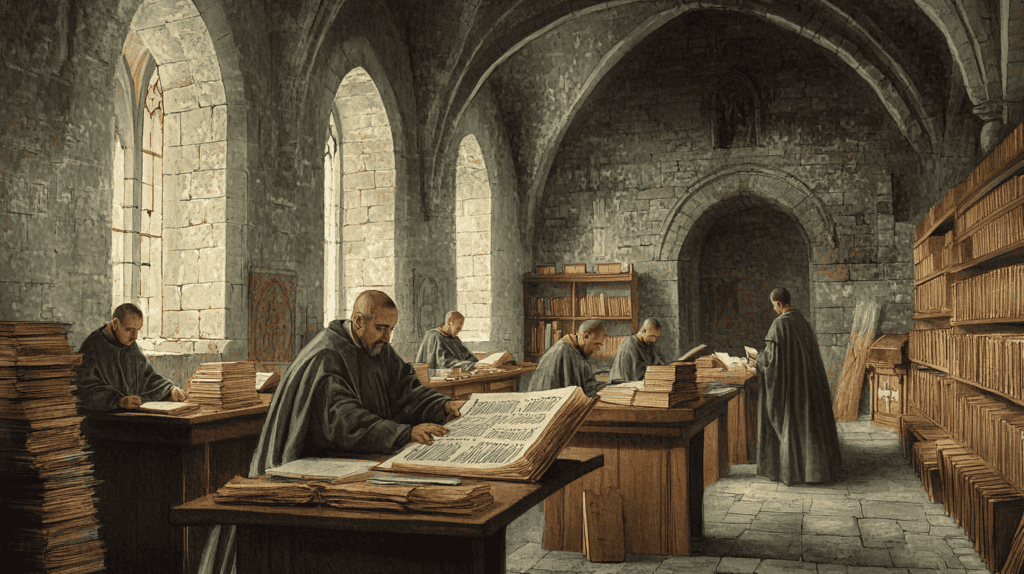
The Venerable Bede’s Ecclesiastical History of the English People stands as a monumental achievement in dark age historiography. Completed around 731 AD, this seminal work provides a comprehensive account of the religious and political history of England from the Roman conquest to Bede’s own time in the 8th century.
Background and Context
Bede, a Benedictine monk born around 672 AD in Northumbria, spent most of his life at the monastery of Jarrow in northeast England. Known for his scholarly pursuits and prolific writing, Bede was one of the most learned men of his time. His Ecclesiastical History represents the culmination of years of research and writing, drawing on a wide range of sources including documents, oral histories, and eyewitness accounts.
The work was composed in Latin, the scholarly language of the time, under the title Historia ecclesiastica gentis Anglorum. It was dedicated to King Ceolwulph of Northumbria, to whom Bede had sent an earlier draft for review and approval.

Structure and Content
The Ecclesiastical History is divided into five books, each covering a distinct period or theme in English history:
Book I: Provides geographical background on Britain and covers the period from Julius Caesar’s invasion in 55 BC to the mission of St. Augustine in 597 AD.
Book II: Recounts the progress of Christianity in England from the death of Pope Gregory the Great in 604 to the death of King Edwin of Northumbria in 633.
Book III: Focuses on the growth of Christianity in Northumbria under Kings Oswald and Oswy, culminating in the Synod of Whitby in 664.
Book IV: Begins with the consecration of Theodore as Archbishop of Canterbury and covers various ecclesiastical developments across England.
Book V: Brings the narrative up to Bede’s own time, including accounts of contemporary missionary activities and concluding with a summary of English church history.

Key Themes and Perspectives
Bede’s work is characterized by several important themes and perspectives:
Conversion narrative: The central focus is on the conversion of the Anglo-Saxons to Christianity, portraying it as a divinely guided process.
Roman vs. Celtic Christianity: Bede highlights the conflict between the Roman and Celtic traditions of Christianity, ultimately favoring the Roman practices.
Unification of England: The spread of Christianity is presented as a unifying force for the various Anglo-Saxon kingdoms.
Divine providence: Bede interprets historical events through the lens of God’s intervention in human affairs.
Missionary zeal: The work emphasizes the importance of missionary activity, both in converting England and in England’s subsequent missions to continental Europe.

Sources and Methodology
Bede’s approach to historical writing was remarkably thorough for his time. He drew upon a variety of sources including: written records from monasteries and churches, letters and documents from Rome and other ecclesiastical centers, and oral histories and eyewitness accounts.
Bede was careful to cite his sources and often expressed caution when dealing with uncertain information. This methodical approach has led many scholars to regard him as the father of English history.
Significance and Impact
The Ecclesiastical History quickly became a widely read and influential text. Its importance can be gauged by the fact that nearly 200 hand-written copies were produced in the Middle Ages, an exceptional number for that era. As one of the few substantial written sources from this period, Bede’s work is crucial for understanding early English history. It provides invaluable information on the political, religious, and social developments of Anglo-Saxon England.
Additionally, Bede’s clear, accessible Latin prose style set a standard for medieval historical writing. His work influenced subsequent generations of chroniclers and historians.

Legacy
While Bede’s work is invaluable, modern historians recognize certain limitations. For example, Bede’s pro-Roman stance leads him to downplay the contributions of Celtic Christianity and native British Christians. Also, while generally reliable, some of Bede’s accounts, particularly of earlier periods, contain inaccuracies or legendary elements.
Nonetheless, Bede’s Ecclesiastical History stands as a testament to the intellectual achievements of early medieval England. Its blend of historical narrative, hagiography, and theological reflection provides a unique window into the world of Anglo-Saxon Christianity.




